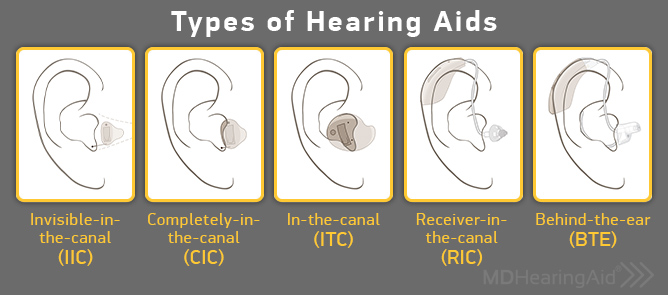For decades, hearing clinics have been the standard way for people to access hearing care. Nowadays, there are many places you can go to get hearing aids. You’ll find them at clinics, private practices, hearing aid retailers, and wholesale stores. But with online shopping becoming the norm, you may be wondering, “Can I buy hearing aids online?”
The answer is a resounding, “YES!” With telehealth readily available, there’s never been an easier way to get hearing aids on your own. You can even complete your hearing test online.
Buying hearing aids online offers many benefits, from convenience to massive cost savings. Before you pull out your credit card, it’s important to understand what that entails. Why? Because quality, pricing, and other aspects vary and could impact how well you hear.
We’ve put together this guide to help answer questions about buying hearing aids online.
Please use the following quick links to navigate the article:
- What are Hearing Aids?
- Do You Need a Hearing Aid?
- How to Choose the Right Hearing Aid for You
- Buying Hearing Aids in Person Vs. Buying Hearing Aids Online
- Advantages of Buying Hearing Aids Online From MDHearing
- How to Get Started With Better Hearing
What are Hearing Aids?
Hearing aids are medical devices used to treat hearing loss and understand speech more clearly. At its most basic, a hearing aid picks up audio from the surrounding environment, amplifies and clarifies it, and then transmits the sound to the inner ear.
Hearing aids should not be confused with amplifiers, which simply make all sounds louder (including background noise). A hearing aid is a much more sophisticated device that is regulated by the FDA.
Benefits of Hearing Aids
Hearing aids work wonders for many people who have hearing loss. In addition to improving communication, hearing aids offer many benefits for your physical, mental, and emotional wellbeing:
- Reduced strain when hearing
- Easier listening in various situations
- Ability to hear in noisy environments
- Improved personal and professional relationships
- Less social isolation and depression
- Lower risk of dementia and cognitive decline
- Slow down any further hearing loss
- Greater independence
- Better overall quality of life
PSAPs vs Hearing Aids
Amplifiers (personal sound amplification products or PSAPs) are cheaper than hearing aids. Many think they’re viable options, but they are nonmedical devices. PSAPs merely amplify sounds and are made for recreational purposes (e.g., hunting, birdwatching, stage performances). They aren’t intended for people with hearing loss and can’t be customized for an individual’s hearing loss.
Hearing aids, however, are registered with the FDA and regulated under five classifications as either restricted class I devices or class II medical devices. Class I air conduction hearing aids are FDA-registered and do not require a prescription. Air conduction hearing aids are the most common hearing aids designed to treat mild to moderately-severe hearing loss. These are the ones you typically see that come in many different styles worn either behind the ear or in the ear.
It’s essential to choose hearing aids that are FDA-registered and permitted for the treatment of hearing loss. If hearing loss isn’t addressed with the right equipment, you’ll miss out on better hearing and risk further damage to your ears.
Do You Need a Hearing Aid?
If you think you need hearing aids, be sure to do your homework before purchasing. Hearing aids are medical devices and many consumers fall victim to either overpaying for hearing aids or buying inferior devices that can do more harm than good.
Signs of Hearing Loss
Hearing loss usually occurs gradually over time. Even if you think you hear just fine, an annual hearing test can reveal minor changes that you didn’t even notice.
Do any of these situations sound familiar to you?
- Conversations can be challenging to follow, especially in environments with background noise
- You need to turn the volume up on your television
- You frequently ask people to repeat themselves or stop mumbling
- Talking on the phone is difficult
- Women and children are especially hard to hear
If you or a loved one have trouble hearing in your day-to-day life, it’s time for a hearing check-up.
Take a Hearing Test
No matter what hearing aids you decide to buy or where you plan to buy them, you should have your ears checked. A hearing test can identify the type and extent of your hearing loss, and help determine the best hearing aid for you.
You can have your hearing tested in a hearing clinic, over the phone, or online. Many hearing clinics provide free comprehensive hearing tests by a medical professional with no obligation to purchase.
Take the MDHearing free online hearing test now and get immediate results!
How to Choose the Right Hearing Aid for You
There are many brands to choose from when buying hearing aids on the Internet. The hearing aid you choose will depend on various factors, from features and ease of use to comfort and price. You’ll also want to consider the type of support a provider offers along with other services you desire.
Types of Hearing Aids
Every hearing aid consists of the same basic parts: a microphone, amplifier, and receiver (also known as a speaker). However, you’ll find the quality of these parts vary greatly in terms of price, features, and size. Some hearing aids are tiny and less visible, whereas others may be larger but offer more technology features.
There are five primary types of air conduction hearing aids:
- Behind-the-Ear (BTE)
- Receiver-in-the-Canal (RIC)
- Completely-in-the-Canal (CIC)
- In-the-Canal (ITC)
- In-the-Ear (ITE)
Lifestyle/Types of Features You Want
Hearing aid models offer quite a range of features. Some may be more suited than others based on lifestyle, such as a relaxed vs. active lifestyle, employed vs. retired, or smartphone user vs. non-users. Other bells and whistles may not be necessary, depending on your personal preferences.
These are some of the most common advanced features:
- Noise-canceling technology
- Rechargeable batteries
- Smartphone app compatibility
- Wireless streaming
- Bluetooth connectivity
- Remote fine-tuning
- Sound environment settings
- Water-resistance
Hearing aids with advanced features usually come with a higher price tag, but may offer conveniences you can't live without. For example, if you're a smartphone user, app compatibility may be important to you. If you're frequently around water or live in a humid place, you might consider water resistance. Be sure to do your research and select the hearing aid with features that best fit your lifestyle and budget.
Level of Support You Want
When shopping for hearing aids, carefully consider the level of support you desire. Unlike eyeglasses and other products, hearing aids require more clinic-level care from experienced medical professionals for the best results. Whether in-person or online, some of the support you should consider includes:
- In-office exams or online hearing tests
- Clinic-level care by a doctor/audiologist or hearing aid dispenser
- In-person or telemedicine care via phone and video calls
- Paid support during office hours or free lifetime support available 24/7
- Adjustments by appointment or instant fine-tuning via a mobile app
Other Questions to Ask Yourself
It’s also important to look for other things you might not have thought about. You should ask the following questions before making a final commitment.
- Will a licensed audiologist assist me?
- Are the hearing aids FDA-registered?
- How does the specialist choose the best-suited hearing aids for me?
- Do the hearing aids come with a satisfaction guarantee?
- Is there a return period if I don’t like the hearing aids?
- Do the hearing aids come with a warranty when in need of repair or replacement?
- What type of follow-up care will be included with my hearing aids?
- Is there a financing or payment plan to help me afford the hearing aids?
Equipped with all relevant information, you’ll be able to make an informed decision. This helps you avoid making a poor choice that could be detrimental to your hearing, or your wallet. Hearing aids are an investment, so you want to ensure that you get what you need.
Buying Hearing Aids in Person Vs. Buying Hearing Aids Online
Nowadays, you’ll find many places to buy hearing aids online. The U.S. Food and Drug Administration (FDA) also recently proposed the selling of over-the-counter (OTC) hearing aids without the need for an exam, prescription, and fitting. In any case, some people feel more comfortable buying hearing aids in person.
Advantages of Buying Hearing Aids in Person
In the past, people with hearing loss had to make an appointment with an ENT, audiologist, or another hearing specialist to get hearing aids. This is no longer necessary thanks to the option to buy hearing aids online. However, you may still reap a few benefits that you won’t always get when purchasing online, such as:
- In-person Test and Fitting – Making an office visit means you’ll take a hearing test in a soundproof room and have hearing aids fit to you by a professional.
- In-person Support – When purchasing in a clinic, you’ll also receive one-on-one support from the time you take a hearing test to your follow-up visits (but you may have to travel and pay for those extra visits).
Disadvantages of Buying Hearing Aids in Person
Although buying hearing aids in person has its advantages, the process of getting a hearing aid could be costly, lengthy, and inconvenient.
- Cost Thousands of Dollars – You may end up with sticker shock after finding out that hearing aids can cost as much as $4000 to $8000 in a hearing clinic. Unfortunately, most Medicare and insurance plans don’t cover them.
- Time-Consuming Office Visits – At an office visit, a doctor or hearing specialist may review the patient’s medical history, perform an exam, and give a hearing test. Based on the results, a hearing loss will be confirmed, and hearing aids will be custom fit. Often, this involves several visits with doctors and audiologists, including follow-up appointments.
- Accessibility and Distance Issue – Getting to an office to be tested and fitted for hearing aids can be problematic for many. Americans who live in rural areas may have to drive very far in order to visit a clinic. Those who are unable to drive or don’t have access to reliable transportation face additional challenges. If accessibility and distance is an issue, you may wonder how you can get high-quality, medical-grade hearing aids. You’ll be pleased to know that there are other options for purchasing hearing aids without having to worry about transportation. Addressing your hearing loss has never been easier than it is today.
If you’re still interested in going the clinic route, here’s an overview of the top hearing aid brands. This list will help you determine which ones fit your hearing loss, budget, and needs.
Teleaudiology Removes Barriers With Remote Hearing Services
You no longer must rely on in-person appointments to get a hearing test and hearing aids. Nowadays, technology makes it possible to get medical care at home through telehealth services.
There are different types of telehealth services:
- At-home hearing tests—online, over the phone, or through a mobile app
- Customized settings for your hearing from a smartphone or tablet
- Live, video-chat appointments with closed captioning
- Consultations with hearing professionals
- Phone and email-based support
- Online video tutorials and articles
Advantages of Buying Hearing Aids Online From MDHearing
Modern hearing care and telehealth capabilities have come a long way. We want to help as many people as we can, and advances in technology allow us to reach more patients and improve hearing health in a more convenient way.
Save Big on the Best Technology
Here at MDHearing, all of our FDA-registered devices are designed and tested by medical professionals for patients with mild to moderately-severe hearing loss (94% of hearing loss cases). By eliminating the middleman markups and selling directly to our customers, we can offer our hearing aids as low as $299/pair—saving you thousands of dollars.
Convenience
In addition to significant cost savings, you’ll benefit from the added convenience of buying MDHearing medical devices online. When you place an order, your hearing aids arrive right at your door without the hassle of visiting a busy doctor’s office. You can also take a hearing test online from your living room. If you have questions or need to consult with an audiologist, we’re just a phone call away.
Customized for Your Specific Hearing Loss
Clinics are no longer the only option for hearing aids customized to your specific hearing loss. “Smart” hearing aids, like the MDHearing VOLT MAX, can be customized with an easy-to-use mobile app. The app checks your hearing and automatically adjusts the settings for your specific hearing profile. The VOLT MAX also adapts to your listening environment automatically and can be fine-tuned remotely by MDHearing specialists.
Support From Audiologists and Licensed Hearing Specialists
An audiologist plays a significant role in your hearing health even when you choose to buy hearing aids remotely. That’s why we have licensed audiologists and hearing instrument specialists on staff to provide clinic-level care throughout your hearing journey. At MDHearing, you’ll benefit from the following types of support:
- Remote support by phone, email, or video chat
- Video chats and consultations with closed captioning
- Onboarding and fitting appointments
- Remote adjustments by AuD through our app
Strong Reputation
Unlike most online hearing aid companies, MDHearing has been providing affordable hearing for more than a decade. We were founded in 2009 by a Chicago ENT (ear, nose, throat) doctor who was fed up with the high price of hearing aids, and since then, we've helped more than 500,000 people with hearing loss.
Risk-Free Trial
The best way to find out if hearing aids will work for you is to try them in your own daily life. That’s why we offer a 45-day, risk-free trial and 100% money-back guarantee with all of our FDA-registered, medical-grade hearing aids. There’s no risk in trying MDHearing.
How to Get Started With Better Hearing
MDHearing offers the closest thing to visiting a hearing clinic without actually stepping foot in one—and at a significantly lower cost. We help you save thousands on medical-grade, FDA-registered hearing aids by cutting out the middleman.
A better hearing experience is just a few clicks away. Check out our product comparison page to buy hearing aids online, or see what our happy customers are saying about their MDHearing experiences.
Take the next step toward better hearing with our affordable, FDA-registered hearing aids.
COMPARE HEARING AIDS


